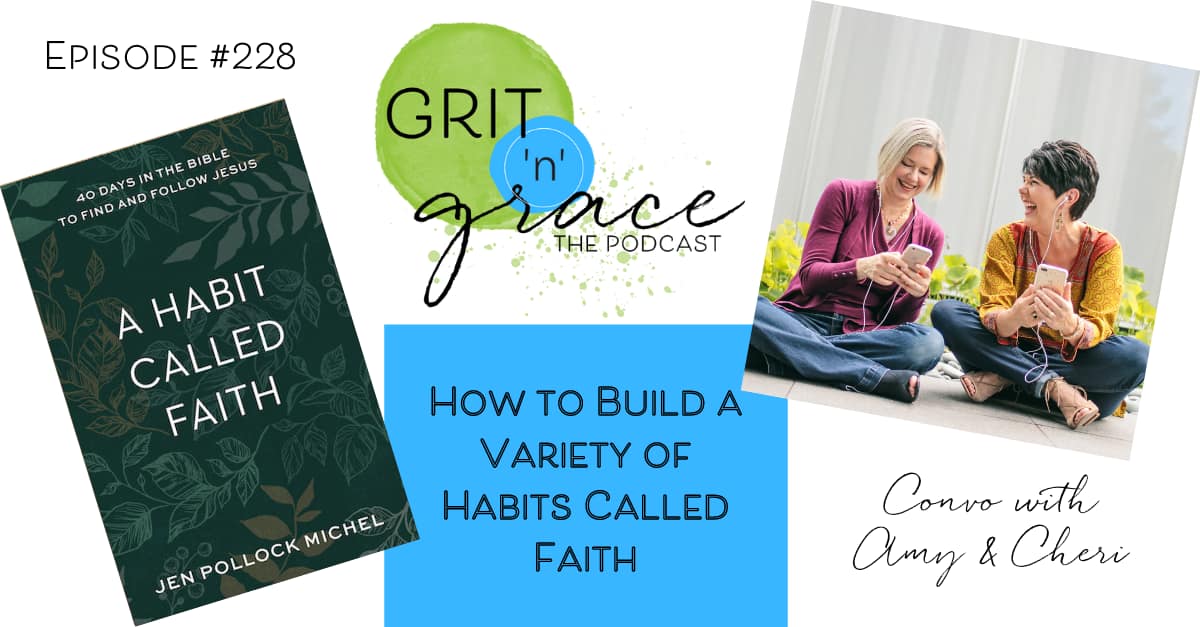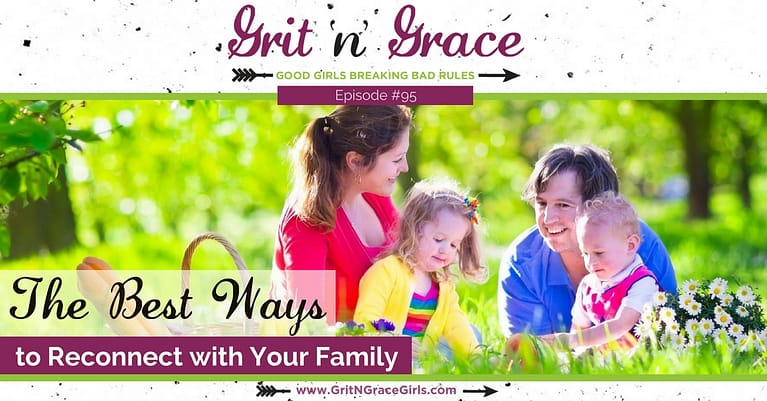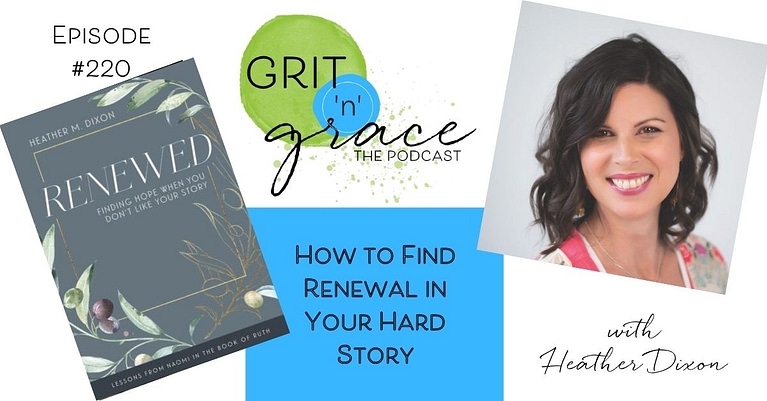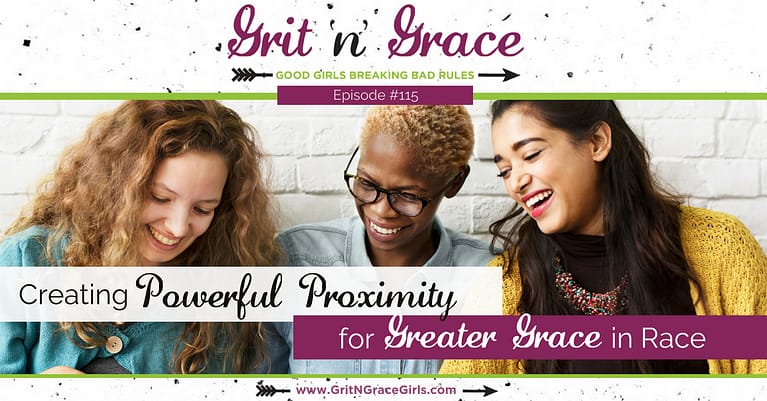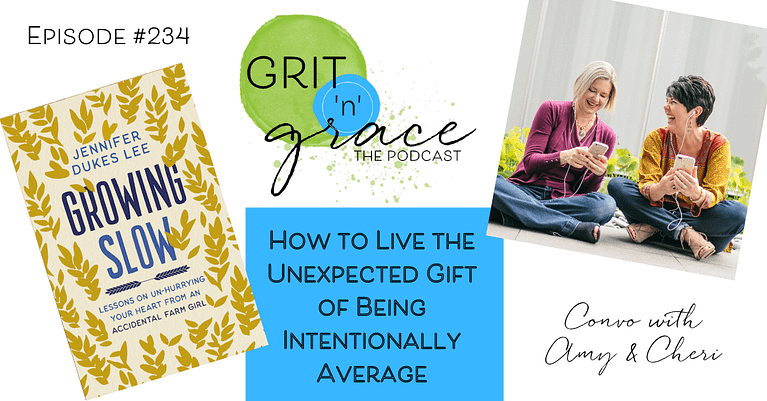Building a habit can have a bad rap unless the end-goal is a pleasure. Knowing God, our highest pleasure, is a goal that can keep us motivated! Today, Cheri and Amy knock obstacles to spiritual growth out of the way and reveal the winsome ways that God keeps them growing.
(This page contains affiliate links. Your clicks and purchases help support Grit 'n' Grace at no extra charge to you.)
Recommended Resources
- Jen’s website
- Blog post: “Introducing a Habit Called Faith“
- A Habit Called Faith: 40 Days in the Bible to Find and Follow Jesus
Your Turn
- What obstacles have kept you from spiritual growth in the past?
- How could actively developing a habit help you overcome those obstacles?
- Which of the habits in today’s episodes appeal to you? Give one a try!
Downloads
Featured Guest — Jen Pollock Michel

Jen Pollock Michel is the author of A Habit Called Faith: 40 Days in the Bible to Find and Follow Jesus. She is also the award-winning author of Teach Us to Want, Keeping Place, and Surprised by Paradox.
Jen holds a BA in French from Wheaton College and an MA in literature from Northwestern University. She is the lead editor for Imprint magazine, published by Grace Centre for the Arts, and host of the Englewood Review of Books podcast.
An American living in Toronto, Jen is a wife and mother of five. You can connect with Jen at www.jenpollockmichel.com, via Instagram, and on Facebook!
Transcript — scroll to read here (or download above)
****
Grit ‘n’ Grace — The Podcast
Episode #228: How to Build a Variety of Habits Called Faith
Cheri Gregory
So what comes to your mind when you hear the word habit?
Amy Carroll
Well, my negativity bias might be showing, but truthfully, a little dread. You know, I know that right now, post-COVID, that I need to do some work to break some bad habits, but it just seems overwhelming to try to form some new ones.
Cheri Gregory
Well, I get it. I get it. I feel a sense of dread because for me habits have always felt like boring and drudgery. Like you know, same old, same old and you know, you just don’t think of words like fun or creativity or spontaneity in the same sentence with the word habit. But in our interview with Jen Pollock Michel, she really challenged both of us to think differently about habits, particularly a habit called faith.
Amy Carroll
She really did. Our conversation might have squashed by negativity bias, I actually got excited about the things that she was sharing with us.
Cheri Gregory
Well, this is Cheri Gregory –
Amy Carroll
– and I’m Amy Carroll –
Cheri Gregory
– and you’re listening to Grit ‘n’ Grace: The Podcast that equips you to lose who you’re not love who you are, and live your one life well.
Amy Carroll
Today, we’re processing what we learned from Jen Pollock Michel, author of A Habit Called Faith: 40 days in the Bible to Find and Follow Jesus. All right, Cheri, start us off. Tell us what we’re NOT.
Cheri Gregory
Alright, so my NOT statement is “You’re NOT a passive list-checker.”
Amy Carroll
Wait, are you sure? Okay, go ahead.
Cheri Gregory
Yes, I know, this is sad for all of us who get our adrenaline rushes from going ‘check!’ But the problem with that I realized is that when we have a set list, it really can be so passive, like, okay, I did that again, just like every other day, bla bla bla, check check check. I mean, it just can become so rote that it’s almost like we aren’t even involved in it anymore. And so when when Jen said this, I found it really a relief, she said, “I think it’s such a relief for some people to realize faith isn’t a long list of to-dos.”
It’s not a whole bunch of obligations will make me happy. So I was thinking of this in terms of individual faith, you know, that it can be so easily to approach our daily devotions out of a sense of duty, and okay, I’ve done it, it can just become this routine, that becomes a rut that really isn’t about our relationship with God at all. It can just be something so flat, that it’s almost as if we did nothing, because we were so passive. And also we can go into the all or nothing thinking with our daily devotions. Like if I can’t do it right, I won’t do it at all. And you and I have talked before about sometimes feeling like if we can’t pull out all the concordances, then we’ll just, you know, skip it for the day. So I love how A Habit Called Faith invites each reader to choose a personalized approach that works for her season of life.
And then I was also thinking in terms of you’re not a passive list checker in terms of,“evangelism.” I was even thinking to myself, my family growing up, we have this expression that we use, we tell each other whenever we’ve done something altruistic or even, like, we would say this, if you know, my mother had made made a cake and there was like, one slice left, and we would make this grand overture like, okay, well, if nobody else is going to eat it, I will go ahead and have pity on the poor slice of cake. And then my dad would always say you can mark it down as missionary work next week in church. I got to thinking about that silly phrase, you can mark it down as missionary work.
Just as another example of how passive and rote and just bland habit this kind of thing can become, and I don’t want to put down on this, but there have been times in my life where I’m like, okay, I’ll just leave a pamphlet for somebody or pass out some kind of a paper or I have found myself passively preaching at or to someone just kind of again, in that habitual rote way. And so I loved how Jen described that A Habit Called Faith could be part of just a really natural conversation and a personal invitation to dive into scripture together.
Amy Carroll
Yes, well, ours are so tied together because mine is “You’re NOT carrying the weight of someone else’s salvation.”
Cheri Gregory
I want you to just say that again, so everybody in the back can hear it.
Amy Carroll
“You’re NOT carrying the weight of someone else’s salvation.” And this is – I needed to say that out loud again for myself, because I have talked time and time again about my overdeveloped sense of responsibility. And I remember specifically a time in college when one of my friends, someone I was close to was really questioning their faith and it looked like they might walk away from their faith, and I saw it as my responsibility to say the exact right words, to make sure that their salvation was secure. And I even find myself falling into that today when I have a friend that I feel like is wobbly or a family member that I feel like, oh, I have to say the right things, I have to do the right things. And I can’t show any cracks in my foundation or hypocrisy, and it’s such a heavy, heavy weight.
But, you know, Jen talks about the way that she reaches out to people in such an organic, beautiful way. It’s not passive, but it’s not an overdeveloped sense of responsibility either. And one of the things she talked about how that interaction with the woman who asked her what she did, and she said, well, she writes about faith. And the woman said, she really believes the Bible is true. I love that. And she said, I think that that kind of reaction is very typical of someone who says, Well, we’ve really grown out of faith. And you know, that’s happening more and more, even in my Southern Bible Belt culture. And she said, I mean, we’re sort of in a new modern era, what’s the solution to it? And she said, the most engaging solution, which is you alluded to, I really think it’s to invite people into the scriptures to see for themselves. You know, the thing is, is really do we believe that God is big enough to draw people to himself, you know, he to get told us that our job is to lift him up so that people can you know, he’s visible, and then he would draw all people to himself. And so we do have a part in this, but the weight of someone salvation does not rest on our shoulders.
Cheri Gregory
I love that. Because what I kept hearing from you is almost that you needed to save people. As you were worried about saying the exact right thing. And really, the best thing you can say is, hey, let’s read this book together. Let’s study scripture together. And so instead of having to save them, your role is to invite.
Amy Carroll
Absolutely. I mean, and I saw that happen in India, I talk about my India experiences all the time. The church is so glorious there. And one of the things that they did is they had people who weren’t even – they hadn’t even believed in Jesus yet. They invited them to prayer meetings and said, God loves you. He cares about your needs. Let’s ask him for it. And then God did miracles. He showed up all on his own
Cheri Gregory
Without any help from Amy or Cheri. Wow.
(Both laugh)
Amy Carroll
Unbelievable! And show people that he was real. Oh, I love that. Yeah.
Cheri Gregory
All right. So lose who you’re not. And mine was you’re not a passive list checker and yours was you’re not carrying the weight of someone else’s salvation.
So moving on to love who you are. And so mine is kind of – I tried to make it a real contrast to my not statement, “You are an active love responder.” Like we respond to God’s love. And I just tried to compact that into something a little shorter. So you we actively respond to God’s love. And that came straight from what Jen said, she said, first and foremost, faith is just a response to the work of love that God has done on behalf.
And then she said, it’s a response to what God has done, but it is a response. There is activity involved in faith. Faith isn’t just this inert sort of thing. And then she had these five words, to see live, love, know and obey. And for me, that whole idea that it’s an active response, it’s not inert. I’ve been really having a huge wake up call, I’ve been reading a book called Boundaries, for the very first time in my life – don’t look like that at me – and oh, my word. And one of the things that just leapt out at me is in so many areas of life how passive I have been, and how I need to be much more proactive.
Well, to be proactive, you can just already hear in the word, the root word is active. And so the idea that here that faith is something that is a response, it’s going to be an active response. And so that then led me to this idea that okay, so habits aren’t this dead, dull, boring, rote thing that you know, we’re barely even lifting our hand to check off a list. But these are the ways that Jen was talking about habits are these robust choices that we’re making, and we put them into habit form? You know, we all know that when something becomes a habit, we’re using a little bit less brain energy, but it’s only because we’re not really deciding every day. We’re not battling it out with ourselves. So we’re not having decision fatigue. That’s the value of making something a habit is we’re not reading negotiating every day and wasting valuable brain energy on that.
But I love how Jen pointed out that habits can anchor us. They can be a stabilizing influence. And she referred she just touched on how you know we’ve had this year now – it’s been more than a year – that’s been so hard and that maybe you know, some of us have had a lack of habits during this time that our time was disrupted and our life was turned upside down. And I was just reading a really interesting article about the personality traits that made lockdown coping easier for people. And it didn’t go the way that people predicted. They thought extroverts were going to have a much harder time, and introverts would have a much easier time. And it turned out that wasn’t quite true. And they thought that maybe people who were open to new experiences would have an easier time. And actually, that didn’t prove to be true.
And so I’m going to quote from the article, it said, there was one winner out of the out of the big five personality traits, conscientiousness, and that’s it. And then the article even says this, what we used to call self discipline. So consciously the more conscientious or self disciplined people were, the less anxious and depressed when stuck at home. People that score highly on this trait are better at hewing to routines that provide structure during endless days of working or studying remotely. And then the article gives an example: I have a friend who never worked coat and tie in the office, but started dressing up in fancy rather eccentric suits during lockdown looking sharp, he ascends every day to his attic to do productive and satisfying work. And so I thought it was interesting that out of out of all these different personality traits, the one that rose to the top was associated with conscientiousness, or self discipline, and having habits in place that care for us that anchor us.
So that made me then think about what she talked about with accountability. So I realize I’m in a small accountability group for my business. And we do a Monday check in and we do a Friday check in and then on my once a month, we do a face to face Zoom. But then when it comes to my faith walk, I’ve kind of like got this, everybody mind your own business attitude. Like, I’m okay for accountability with business. But then I want people out of my business when it comes to faith. And Jen said, you know, she, she did say that she thinks of accountability relationships, they work as long as they’re based on trust and mutual encouragement. But she said you have if you have somebody who would be really willing to pray for you and with you and share their own struggles. And so I realized what I was thinking of, and I’m going to use the wrong word just because it rhymes. But I was thinking of faith walk accountability, what came to mind was, I’ve always thought of it as kind of in terms of degradation, like somebody is going to be judgmental, and make me feel bad. And I’m always going to have failed. And I realized what she was describing was celebration, somebody to celebrate with somebody to I mean, even just that little description she had at the group of women who just text each other and emoji when they’ve done their reading for the day. I mean, it’s nothing big. It’s nothing huge. It’s kind of like what I’m doing in my business accountability group, but I can see how it would make a difference.
And I love, love, love that she emphasized for accountability to start small. Not to measure right away. I mean, those of us who are recovering perfectionist, we look for results so quickly. And if we don’t feel like we’re succeeding this moment, well, at least for me, it’s really easy to either give up or double down. She was really talking about this consistency, and even looking after five years that was kind of mind blowing. So all of this falls under being an active love responder responding to God’s love actively in ways that encourage us in ways that hold us accountable.
How about you? What’s your are statement?
Amy Carroll
Well, I’m fascinated by this whole conversation, because you and I are wired so much alike in so many ways. We’re both recovering perfectionist and people pleasers, you’re an HSP, I’m a borderline HSP, we are highly kind of responsible, I would say discipline kind of people. But I think there’s a contrast in this conversation that is very interesting, where you’re processing this all through wanting to kind of overcome some passivity in your life. And I’m processing through trying to overcome overactivity in my life.
I love it, because I think what happens to me is that if somebody tells me I should have a habit, well, there’s a rule I should follow. And I shouldn’t just do it for 30 days, I should do it for 90 days, and I should do it twice as much as anybody else. And so that’s self defeating, also, because you can’t sustain that kind of activity. But anyway, that’s just a comment about the conversation in general, but my are is “You ARE a signpost to Christ.”
And I think there’s still this tension of passivity versus overactivity. I love that because I was reading a blog post last night and it was absolutely fascinating about what is creating this divide in Christian culture. And I love that Jen reminded us that obey and live are parts of the Christian life. They’re parts of the life of faith. So this other blog post – I’m going to kind of translate it into Amy-isms and tie it back into Jen, like my brain has been spinning around this all morning – is it seems like we have divided into two extremes. Now that this is an oversimplification, but I think people will understand it immediately.
So there is the extreme progressive Christian who believes in all love and grace, but none of the rules. And then there’s the extreme conservative Christian who lives by all the rules, but shows no love and grace. Don’t you see those two camps? I mean, it’s been lived out on social media. And this is what I call the noisy extremes. So these are the very noisy extremes. But what God is calling us to that generally expressed so well, it’s someplace in the middle, you know, some place where it’s not either love and grace or the rules but it’s loving grace and the rules.
I was thinking about Jesus, you know, it says that he grew in grace and truth. And so we think it’s not either or it’s both and, and if we’re either or we are not a signpost to Jesus, that signpost is a disaster. And this is why I believe so many young people are leaving our churches. Maybe it’s not that they’re rejecting Jesus, it’s because they can’t find Jesus in the church to save their lives. I’m like, holy smokes, What a sad commentary. For us to be a signpost to Jesus, we have to have both loving grace and we’re following the rules.
I’d like to use another word. It’s a better word, although it’s a fraught word. And it’s the word holiness. So holiness is such a churchy word, and we can throw it around here and there. And most often it’s been tied to holier than thou, which is a negative, but holiness is a descriptor of the beauty of God. His beautiful perfection, His perfect love, and His perfect grace and His perfect judgments and His perfect everything. I mean, He is perfection. And holiness is a word that really addresses His perfection. So if that is holiness, and we have a call to holiness, it’s all of it. It is the perfect love, the perfect mercy, the perfect grace, the perfect righteousness along with that, we’re called to all of that. And the Bible says, “Be holy, as I am holy.” God says to us, will we achieve that? No, but do we work for that, or we work to that end? Or we grow to that end, maybe as a better word.
And so I love that Jen kind of encapsulated all of it. She did not throw out holiness, she invited us into holiness, as she talked about obedience and living and how we live.
Cheri Gregory
Mmm. I love it. So moving on to live your one life well.
The question that I’m just going to pose here, and I know sometimes I have lots and lots of questions, but I think this is going to boil down to just one question again. And that is what kind of habit feels like a fit for the season that you’re in. And when I say feel, I don’t mean touchy feely, I mean, process what habit that will be. A Habit Called Faith is a fit, you know, whether it is hunkering down with more time in Scripture, whether it is connecting with an accountability group, with those little check ins, what is missing? What is something that would be a habit that would move you closer to God?
Amy Carroll
Fantastic. And my action follows that, which is, once you’ve identified what is that habit that would help you to grow closer to God. And I would say, to use Cheri’s term, that we all have to process that. That comes through really asking God I want to be closer to you, what would help me to grow closer to you, and really paying attention to how you feel like He’s speaking to you there.
And then the action is just take 30 days to do it. And as you and Kathi have taught us in Overwhelmed, put it on your calendar. So you know, pick a time each day to really do that habit and then stick to it is that intentionality that you just talked about that self discipline, or the conscientiousness that helps us to get there. And you know, I think a changing habit is all really about what the end goal is going to be. I mean, that’s what motivates us in being closer to God and understanding His love for us and understanding what He wants has for us to do in His Kingdom. I mean, those are all amazing things that should really motivate us.
Cheri Gregory
So what is the scripture that we are focusing on that Jen gave us for these two episodes?
Amy Carroll
It’s Deuteronomy 36. “The Lord your God will circumcise your hearts and the hearts of your descendants so that you may love Him with all your heart. And with all your soul.” Really wonderful. I mean, this is where true life is. And so is something that we can get motivated and excited about.
Cheri Gregory
So what is the grit for you in all of this?
Amy Carroll
Oh, grit for me, it really is just overcoming the negativity, I think because I am a highly responsible, pretty highly disciplined person. Although some of that took a nap for last year, I’m just saying. But the grid is overcoming the negativity. Because I’ve almost swung to the opposite extreme in this, I feel like God’s been teaching me a lot about freedom. So I’m like habits mapping. So I think I need to find some balance in there, continue to pursue God into freedom, but also remind myself that habits have a good purpose because they lead to the end goals that we desire. How about you? What’s the grace?
Cheri Gregory
Well, your words lead perfectly to the grace part. One of the things Jen said that sticks with me is she said that, and this isn’t a direct quote, I’m saying it from recall. But she said habits can increase our desire for the thing that we’re doing. And I thought, Oh, so there’s an element of choice here, that this habit called faith is our response to God wooing us, it is not a response to a punitive authority figure. It is not even a response to the church people around us. It is our response to someone who loves us and wants to spend time with us and wants us to be the way He created us to be in relationship with Him. And that is ultimately incredibly appealing and full of grace.
Amy Carroll
Well, you know, one of the things that Jen said in her interview was that when she first came to know the Lord, that someone said to her, you need to develop some habits so that your faith sticks. I’m very grateful that I had some people like that in my life, too. Because right around 16, I developed the habit of a daily, what we call quiet time. It’s a daily quiet time. But I’ve been excited how my quiet time has changed over time. It’s been lots of different things different times. But for five years, I use the first five app to go through the entire Bible in five years. And it was wonderful. And you know me, Cheri, my soul responds to structure. I love a plan. I love some rules. I love structure. And so I really, I was thriving in that.
Well, as I got towards the end, even though the first five app is still active, and they’re still doing things, that it was an end for me when they got to the end of the Bible, and that God was calling me to something new. And the something new has been fascinating because it has been a lack of structure. And I have felt like God has said every morning, I want you to sit down. So there is that structure, there’s still that habit. And once you sit down and say spirit, where do you want me to go? And man, it has been a wild and wonderful ride and like currently what it looks like for me – just so our listeners don’t think well, what in the world – I had a spiritual direction call with Christie that I talked about recently. And so my assignment, I hated it. She told me to sit in the suffering. I was like, what, could you give me a book to read, something, but it’s been the perfect thing. And I felt like in my quiet time, the Lord said, Why don’t you make a I want you to make a list of all the ways that Jesus suffered.
So I’m reading the book of John and listing all the ways that Jesus suffered. And then Christie in the next call said to me, she said, oh, isn’t that beautiful? You’re connecting your suffering to Jesus, but you’re also growing your empathy for Jesus and the way He suffered now. It’s like, wow, I didn’t even see that. But yes, that is happening. So it’s been amazing to have the structure for a time and now not so much structure for a time. And I think the point is there’s no right or wrong way of following God, we follow him into habits that grow us in him, and that’s going to look different in different seasons.
Cheri Gregory
Absolutely. You know, I love how Jen has built varying levels of involvement. I was thinking, you know, somebody who’s in a position kind of like me, where I’m doing something very similar for me, it’s not so much to what I’m doing. It’s that I’m spending the time and showing up and I do I have some books that I keep returning to, but the point of that so called quiet time, isn’t that I checked through the lists, like I was saying, it’s much more about the lingering the having the longer time to linger. So I’m in a season of life where I have more time. And so with Jen’s book, I can do the whole reading, I can do all of the journaling and all of the questions, but I love how she has it set up so that somebody who genuinely has less bandwidth, genuinely has less time because of other commitments, maybe for children or for aging parents or a job that takes them out of the home, whatever it might be, that there is still a level of involvement they can do and so that they can develop a habit of faith, even if it’s not the exact same habit of faith as everyone else.
I noticed the book is not titled The Exact Same Habit of Faith. It’s titled A Habit Called Faith, which means that it’s personal. It’s relational.
Amy Carroll
And on that note, I love the way Jen structure the book so that you can invite someone into A Habit Called Faith, who does not even believe in Jesus yet, and how she very much sees this as a progression, a spiritual progression to believe through Scripture, which, wow, again, allowing God to be big enough to draw people to himself, if we just hold Him up and say, hey, He’s meaningful in my life, and invite people into that and her book allows us to do that.
Cheri Gregory
Well, friends, We sure hope you’ve enjoyed listening to episode number 228 of Grit ‘n’ Grace: The Podcast as much as we’ve enjoyed making it for you.
Amy Carroll
And we want to say a big thank you to Jen Pollock Michel author of A Habit Called Faith: 40 days in the Bible to Find and Follow Jesus and her publisher Baker Books for making this episode possible.
Cheri Gregory
Check out our web page at gritandgracethepodcast.com/episode228. There you’ll find this week’s transcript, a link to order A Habit Called Faith: 40 days in the Bible to Find and Follow Jesus and a link to Jen’s website which has some great resources related to her book.
Amy Carroll
Next week we’ll be talking with Barb Roose, author of Breakthrough: Finding Freedom in Christ.
Cheri Gregory
For today, grow your grit,
Amy Carroll
embrace God’s grace,
Cheri Gregory
and as God reveals the next step to live your one life well,
Amy Carroll
we’ll be cheering you on. So –
Both
TAKE IT!

